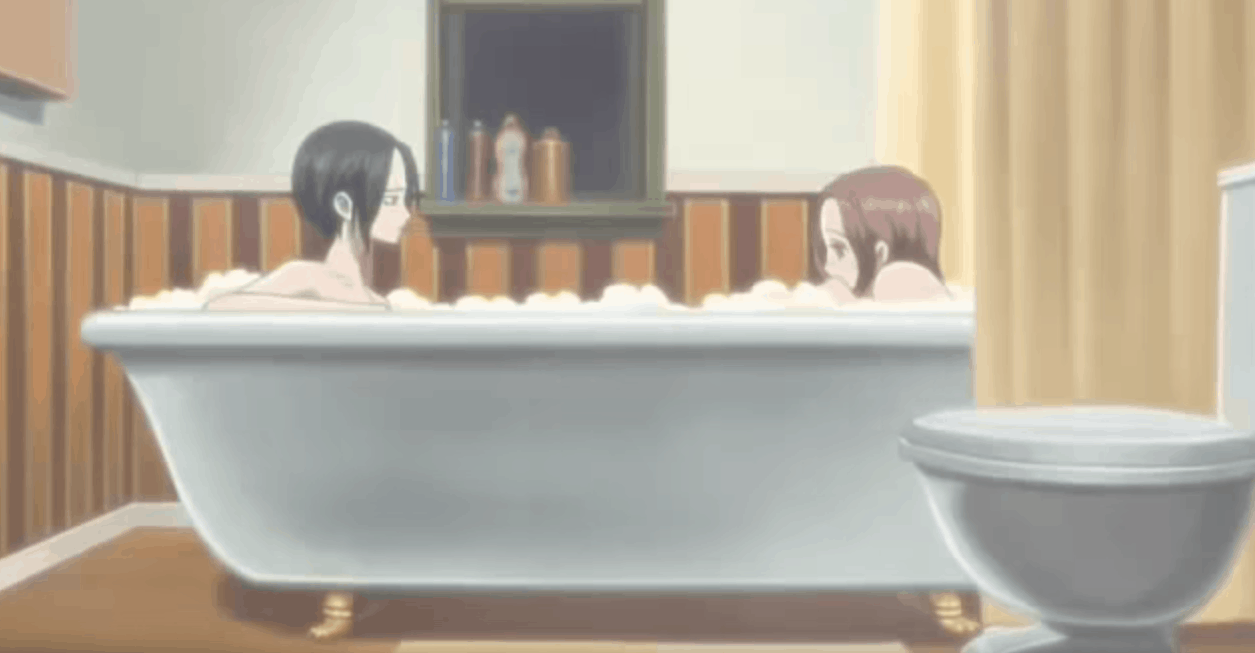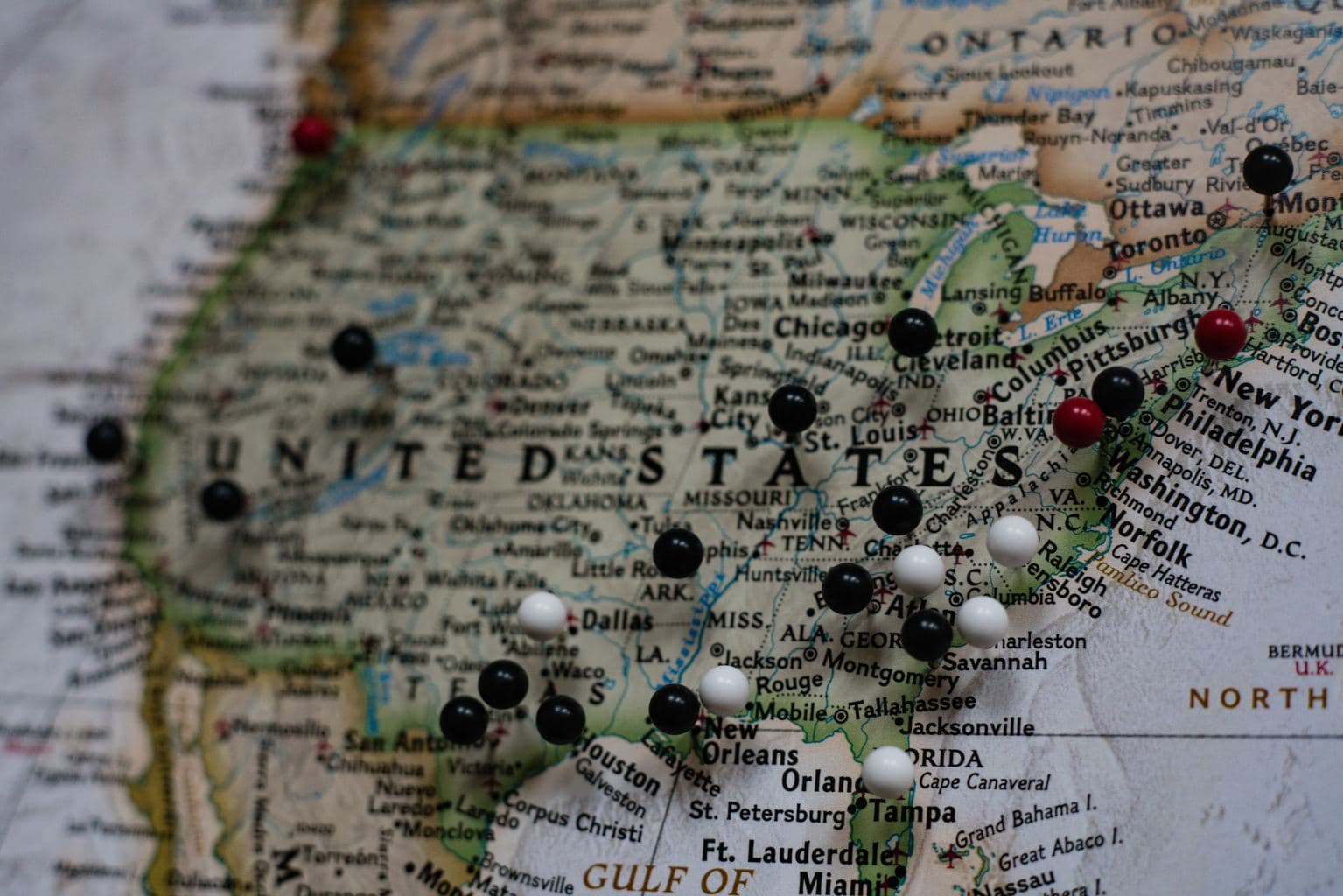
In the anime series Nana, which I’ve written about for CF before, there’s a scene where Hachiko (Nana K.), elated over being asked out by a love interest, hops into the bathtub with her new friend and roommate, Nana O. They chat and tease each other, Nana O. gives Hachiko a little advice and encouragement, and the moment ends fairly casually with a cut to the next scene.
The friends-in-the-bathtub moment is a fairly common trope in anime and other visual narrative forms (I can think of two scenes in Girls alone), and understandably so; the physical intimacy and vulnerability of being naked together easily represents or translates to emotional intimacy and vulnerability.
Even visually, these scenes are emotionally intimate – two faces in profile, facing each other, their silhouettes mirrored but their bodies obscured. Nana, in particular, uses this trope not only to demonstrate emotional intimacy between the Nanas, but also to show a lack of emotional intimacy despite physical intimacy when they later bathe with their respective romantic partners, their friendship strained by their story’s dramatic arc.
When I first read Nana as a 14-year-old, I remember being shocked and heartsick over that scene, and carrying its image with me for a long time. Not because I was shocked by the scene’s nudity (it’s definitely not the first nude scene in Nana) or the (lightly) implied sexual tension, but because I wanted what it represented: an intense, emotionally vulnerable, and loyal female friendship like Hachi and Nana O’s. And, even at the tender age of 14, I felt like I would never have it. Even now, at 26, I feel like I’ve spent most of my life in search of it. My therapist even calls it my “bathtub friendship,” like my own claw-footed white whale.
And yet.
I’ve learned that friendship is not a bathtub, but a constellation.
Often, when we see female friendships portrayed on-screen, especially for young women, they’re established, seemingly unshakable, and nearly always an intense one-on-one friendship surrounded by a strata of secondary characters or male interlopers/love interests, à la Lizzie and Miranda, DJ and Kimmy, Hannah and Lilly, Carly and Sam. Sure, these girls lie to each other, fight, disagree, and even betray one another, but it’s cleanly resolved at the end of 30 minutes – BFF forgiven, and the spat, narratively, forgotten.
I think we’re meant to understand that these on-screen friendships are exaggerated, but as a child, it’s hard to extract the nuggets of reality from the fantasy when these are the only models you have of a thing you’ve yet to experience.
As early as middle school, I remember feeling like everyone else had a best friend and I was the broken one. Overnight, it seemed, these friendships appeared – you never saw one girl without the other. They were their #1s on Myspace, they texted each other furiously during the classes they didn’t share, they kept each other’s secrets. Their friendships were even codified into the school’s social fabric, their names a portmanteau.
The friendships I had seemed to pale in comparison, even the good ones, the intense ones. And they suffered for it – from too-early oversharing to undercooked honesty to lashing out in disappointment.
It’s not even that the friendships I had were bad (though some definitely were – it was high school, after all). I was looking for my Hachi, my Nana, and no one seemed interested or good enough to play that role. By the time I left for college, I felt like I had left a trail of bodies in my wake, a string of failed best-friendships that exploded or suffocated under my unspoken expectations of what ‘friendship’ was supposed to be – unshakable loyalty, unending forgiveness, unspoken understanding. I felt more broken, alone, and misunderstood than ever.
Friendship is a constellation.
In college, it was better, but it was worse. For a while, I stepped back from those expectations, in part because I was intensely involved in my relationship with the man who would become my partner, and in part because I valued my new friendships so much that I was terrified of imploding them with my neediness. I found myself with great friends, friends who were loyal and intelligent and kind and fun and funny, who loved me for me and I for them. I even had “best” friends who I could lean on when the ish hit the fan.
And yet, when my partner graduated two years before me and we started doing the long distance thing, it left me raw, vulnerable, and depressed. The expectations crept back in. I graduated college with some dear friends, but barely, it felt. I lost some good ones on the way. And still, no bathtub friendship, so it seemed.
How is friendship a constellation? I’m getting here.
In the summer of 2014, my friends and I graduated; I got married. We scattered on the wind, to Philadelphia, to Baltimore, to Minneapolis, to Louisville, to Portland and to Germany. I started a new job, I got cats, I acclimated to married life. I missed my friends, but they were so far-flung that a scheduled call, a group chat, and promises of visits were the best I could do for them, and the best they could do for me.

We made new friends where we lived, good ones, and we found our weekends full of house parties, hang outs, and brunches. I still kept in touch with the old friends – through Snapchat, Facebook messenger, text, Instagram, Facetime.
We fell into natural habits – I reached out to one friend to talk about video games and Youtube drama and poetry, I reached out to another to talk about Kesha and Queer Eye and craft beer. One was always there to listen when I had to rant about work; one was always down to discuss periods and mental health. I sent all of them memes that reminded me of them, all different.
I tell you all of this because I don’t know the exact moment my perspective changed, but at some point I stopped having expectations of my friends – and by that I mean, I stopped projecting how I thought they should be onto them, and I started seeing them for who they were.
I was meeting them where they were at, rather than forcing them to meet me. I also no longer felt their ‘shortcomings’ as friends so personally. The one friend who either never responds back or responds right away – it’s not that she wasn’t loyal, it was that her job is crazy and sometimes she just doesn’t have time to text. The one friend who doesn’t really do heart-to-hearts – she wasn’t raised that way. She’ll bend your ear about anything else, but that stuff’s going to be hard for her.
It’s impossible not to bring expectations or your own emotional baggage to a friendship, and it’s good to have boundaries and an understanding of what you will and will not tolerate in a relationship. That’s healthy and mature AF.
But when your expectations of others surpass what they’re truly capable of being – expecting them to fulfill all of your emotional and intellectual needs, for example – both of you will walk away from that relationship frustrated and disappointed. (For Nana fans following along, yes, I realize this is what happens with Nana O and Hachi’ friendship, too.) We do an okay job of understanding this with our romantic and life partners, but, at least, for me, it took an embarrassingly long time to understand this applied to my female friendships, too.

What I mean by friendship is a constellation is this: people can only do so much, show you so much, and if their friendship is valuable to you, you have to learn to do what you can with what they give you.
You can never wholly know another person completely, so all you may get is some light here and there, sometimes more than others. The rest – you have to fill in, and be okay with being in the dark on some parts.
At 14, I would have given anything for that unshakable, all-knowing best-friendship. But now, I would rather look up and see a sky full of constellations, each more beautiful and mysterious than the last, and tie together the bits of light that all my friends have shown me into shapes I can understand, than sit across from just one naked person in a bathtub.
The friends I have now – the ones who have stood by me and patiently understood while I’ve connected the dots in the dark of my own constellation, are the best I’ve ever had. Some of them I’ve had since I was 12, some came back into my life with grace in their hearts, some I’ve only known a short time but have taught me so much. I’m glad they stuck around while I figured it out.
Friendship is not a bathtub, but a constellation.
What did you think?
Do you like the personal essay format? What did you think of this topic? Let me know in the comments below!

I feel this. I, too, craved having that exceptional “best friend” throughout high school and most of college…learning to accept that no one person can fulfill all of my needs all the time. Friendship is a constellation! nice article.